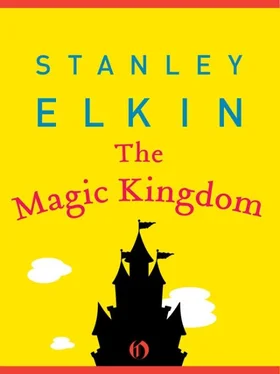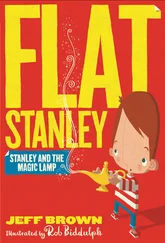Stanley Elkin - The Magic Kingdom
Здесь есть возможность читать онлайн «Stanley Elkin - The Magic Kingdom» весь текст электронной книги совершенно бесплатно (целиком полную версию без сокращений). В некоторых случаях можно слушать аудио, скачать через торрент в формате fb2 и присутствует краткое содержание. Год выпуска: 2010, Издательство: Open Road Integrated Media LLC, Жанр: Современная проза, на английском языке. Описание произведения, (предисловие) а так же отзывы посетителей доступны на портале библиотеки ЛибКат.
- Название:The Magic Kingdom
- Автор:
- Издательство:Open Road Integrated Media LLC
- Жанр:
- Год:2010
- ISBN:нет данных
- Рейтинг книги:5 / 5. Голосов: 1
-
Избранное:Добавить в избранное
- Отзывы:
-
Ваша оценка:
- 100
- 1
- 2
- 3
- 4
- 5
The Magic Kingdom: краткое содержание, описание и аннотация
Предлагаем к чтению аннотацию, описание, краткое содержание или предисловие (зависит от того, что написал сам автор книги «The Magic Kingdom»). Если вы не нашли необходимую информацию о книге — напишите в комментариях, мы постараемся отыскать её.
The Magic Kingdom — читать онлайн бесплатно полную книгу (весь текст) целиком
Ниже представлен текст книги, разбитый по страницам. Система сохранения места последней прочитанной страницы, позволяет с удобством читать онлайн бесплатно книгу «The Magic Kingdom», без необходимости каждый раз заново искать на чём Вы остановились. Поставьте закладку, и сможете в любой момент перейти на страницу, на которой закончили чтение.
Интервал:
Закладка:
Or that Charles Mudd-Gaddis, snagged on some shard of memory — is it personal or just more ancient history? — vague as the scattered fragments of a dream (how terrible to grow so old, infirm and invalid, to feel summer like a chill, trapped not only in skeleton — brittle as archaeology — and flesh — brittle as skeleton — but hobbled by crochet, got up like furniture, all the doily cerements of the old, the caps and shawls and lap robes — and a thousand years ago, it seems, worked out his answer, waits only for the question to be asked, the secret formula of his geologic life, will tell the smart-ass kid whose assignment he will be, will tell, if he can still remember his own remarks, will tell, will say, “Masochism. You’ve got to love pain and worship humiliation”—to be permitted such a long, forced-march lifetime), tries, as if he were trying, working about the obstacles of pain, all the pangs, nips, cramps, and bruises of his land-mined steeplechase being, to draw a very deep breath, to grasp and hold it? Pleasure was in it. He’d been a sort of witness. Shared the witness. With. A baby? How could that be? Since the baby had spoken. He distinctly remembered. Well, distinctly. But they were all babies to him, to a man of his years. The nurses and attendants. So not literally a baby. And there was something illicit. A display or performance. All right, some secret display or performance which had given him, them, himself and the child, pleasure. They’d gone to see some show. On an outing. But without the others in the Home and not to some museum of ancient history like this one today, where all there’d been to look at were some old-fashioned space platforms and obsolete computers like faded daguerreotypes. His nurse. Of course. His nurse. The one who smelled of that foreign tobacco. Whom he sat next to. He’d, they’d — himself and the other old-timer — spied on his nurse. Or that he had the memory now, only couldn’t make sense of that comment afterward, the ancient mariner’s, who’d asked him, “How about them hidey-holes in her hidey- hole, Charley?”
Or that Rena Morgan was exhausted?
Or that Mary Cottle, out of the starting gate serene, her laundered nerve endings smooth as fresh sheets, has begun to feel not the oppression again (which hadn’t been there even in that tunnel-of-love rideup time or even under the circumstances of their imposed coze — the kids calm, sedate, almost contemplative, their attentions absorbed, whatever preoccupied them releasing them for once from whatever had preoccupied them, their pull of obsession, the steady-state tensions of their defective bodies, because, face it, these children, why she bothered with them, who was, after all, the improbable party here, less probable than Nedra Carp, less probable than Bale, were, for her, projections not of the two stillborn fetuses which she did not have or even of the two aborted amniocentesisized fetuses which she did, the two wounded full-term babes themselves, damaged goods, those little suffering citizens whose sealed, suspected tantrums and soft exacerbated lives triggered, probably in inverse ratio, her own violent encounters with herself, her furious fixes) but still an itch, pastel, softer than she’s accustomed to, even tender, locked in the wavelengths and frequencies of something like courtship— nothing alien is alien to her — some strange and lovely magnetism of skin, the compulsive yearning of the centrifugals along the tumbling, degraded orbit of her life, her interests focused for once on the conventional forks, playing catch-up who’d been hung up on fastidy and reserve but who knew her G-spot like the back of her hand, what the fuss was all about; this woman, lusty as a sailor, a fleet, a navy, bringing the spilled beans of her fevers and kindling points like all the pressed and faded roses of love, not barbarians at her gates now but blander, more unsuspected things, not the wired protocols of flesh or her body’s steamy skirmishes and star wars so much as the politics of etiquette and love, all the gossip of the heart and head, of some brand-new flower style like those dumb sexual displays in nature, the bright bandings on birds, say, who do not even know that what they’re wearing is instinct and evolution; that innocent, that naive, up to her ass in guilt and underwear and outraged as someone trying to clear her name, wanting, needing frill and circumstance, some all-the-trimmings life she hadn’t ever lived and hadn’t even known she’d longed to live, her lust diffused, broad and scattered as cloud cover? Or that the old gaffer seated between them, Mudd-Gaddis, could just as easily be patriarch as child, is patriarch, some ancient totem of relation who monitored behavior and whom they had to impress to please, wanting, she who had never wanted anything from men, some soft service, the honorable, ancient courtesies of pleasure: flowers and candy boxes in Romance’s turnstile, toll-booth doorways, vino, gypsy violins, and, later, the more inventive stuff: pet names and pretty speeches, billet-doux, the rose beneath the windscreen wiper, a star of one’s own, sonnets initialed as handkerchiefs, gems in the picnic hamper, cars sent, orchestras bribed, baths drawn — all Soft Soap’s pretty handouts, all Love’s free lunch? Or that wholesome, afferent affections shot from the juiced peripheries of her heart to collect and gather like pooled blood beneath the little old gaffer, child-totem-patriarch’s and Cupid-kid’s dim scrutinies?
So how could Eddy, who could not sort his own, have made anything at all of the jumble of mixed motives and crossed purposes, ordinary and routine as heavy traffic, or seen design in their snarl of wills, feelings, and intentions, asynchronous and asyndeton as timber soaking in a logjam?
4
Well, Colin Bible had seen enough. He’d a feeling he’d disgraced himself. He’d been had. But was in no position to cast aspersions. The guy was as good as his word (though, just as well, not that great in bed). The repair manuals were waiting for him in an outsized manila envelope when he checked his and Bale’s box the next day. There were even some blueprints Matthew had been able to lay his hands on, even a few diagrams of what Colin supposed — he was no mechanical illiterate, after all; he was a nurse, could make a certain sense of x-rays and cardiograms, plug in I.V.’s and administer shots, and just generally knew his way around the human body (oh, yes, he thought, remembering and flushing), which was as complicated as any piece of just machinery — were schemata for wiring, for fire alarm systems, burglar.
But, he saw, the Empire was finished, over, dead. The future, certainly the present, was with the superpowers and the go-getter Nips. They had the nuclears and lasers, they had the highest tech and the microchips and the animatronics. One day soon there wouldn’t be an up-to-date, decent, self-respecting tourist attraction left anywhere between America and the U.S.S.R. Everything else was just scenery — yes, and they had the wilderness areas, the deepest canyons and longest rivers; they had the sunsets; they had the climates — and thrill rides. There’d be nowhere else a dying kid could go.
But his real gloom, his real patriotism, he reserved for Colin back in Blighty in his obsolete waxworks. (We have the wax.) Poor Colin, Colin thought, and could not have said which one of them he had in mind.
No, by disgrace he meant he’d allowed his desperation to show and knew that, in his position, Mary Cottle would not have permitted herself the luxury. He admired the woman, and if he tried to snitch on her that time she’d become separated from the group, that had only been duty. The desperation was something else. Everyone’s desperate, he knew, Mary Cottle included. It was giving oneself permission to reveal it that was off. Like the poet said, most blokes lead lives of quiet desperation, but the poet was wrong. Most blokes shouted it from the rooftops, they shouted and shouted it till the rafters rang. He yearned for the days of his former silence, for the old-time, stiff-upper-lip qualities that made him British and had kept him in the closet. He wanted his quiet desperation back. (It was too late, of course. If they hadn’t maintained such a sterile field in this place — you could practically operate here — his name would be spray-painted all over the lavs by now.) It had been Mary Cottle’s room they’d used, Mary Cottle’s bed — his nursing skills had come in handy when he remade it; Matthew marveled at his hospital corners — and the least he owed her was his silence. He hadn’t told Gale it was not his room. He didn’t know what she was up to in hiring a hall — he’d cut Nedra off when she offered her theories after telling him of its existence — but desperation was bound to be in it. He’d leave her to Heaven. She could be one of the blokes to lead the quiet desperation life. While he, now he was in it, would have to continue to make his unseemly noises.
Читать дальшеИнтервал:
Закладка:
Похожие книги на «The Magic Kingdom»
Представляем Вашему вниманию похожие книги на «The Magic Kingdom» списком для выбора. Мы отобрали схожую по названию и смыслу литературу в надежде предоставить читателям больше вариантов отыскать новые, интересные, ещё непрочитанные произведения.
Обсуждение, отзывы о книге «The Magic Kingdom» и просто собственные мнения читателей. Оставьте ваши комментарии, напишите, что Вы думаете о произведении, его смысле или главных героях. Укажите что конкретно понравилось, а что нет, и почему Вы так считаете.












